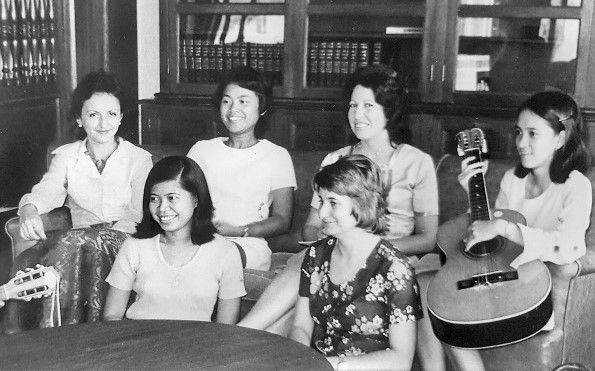The blessing of St. Josemaría
On October 6, 1965, Sole Usechi, Maria Teresa Martinez Baron and Lali Sastre were in a small living room inside the headquarters building of Opus Dei in Rome. A few months earlier, they had received the invitation from the Founder of Opus Dei to start apostolic work in the Philippines. St. Josemaría entered the room, accompanied by Don Alvaro del Portillo and Don Javier Echevarría. He welcomed them with a big smile and in a jovial tone exclaimed, “My daughters, are you happy that you will be going to the Philippines?” The answer was firmly and unanimously affirmative.
The Founder had prepared some gifts for their new country: a set of table napkins from the Philippines and a silver frame in which to place an image of the Blessed Virgin. Then he took out from his pocket a rather bulky package and put it on the table saying, “This is for you, so you get up on time...” It was an alarm clock.
Then he gave them some advice for the future, “Keep calm, never lose your peace, do not be overly anxious. Leave anxiety outside the house and shut the door. If you need more hands to help you out, speak up. However, the apostolic work in the Philippines has to be carried out by Filipino flesh and blood. There will be many vocations. You have to form them very well and later you will be sending them to the Roman College.” He continued speaking, giving them advice as would a father who is bidding goodbye to his children before a long trip. “Don’t fail to write to me....” And he asked them to pray for him (…)
The moment of farewell came: Sole, Maria Teresa and Lali knelt to receive the blessing. This is the manner by which the Founder of Opus Dei would send off his children who were beginning apostolic work anywhere in the world: with an image of the Blessed Virgin, a crucifix, a small detail of affection, and his blessing. It had to be this simple because back then they had scarce resources and lacked most everything, even if he wished that those leaving to start in other countries had the necessary material means as far as possible.
He had nothing to give them, but they were taking with them something more valuable: the blessing of a priest.

The first steps
The next day they took the flight to Manila. Once on the plane, each reacted in her own way.
Sole, 25 years old, was from Navarre and had a determined character; dark-haired and athletic, she was going to be the Director. Maria Teresa, from Andalusia, was a lighthearted person, of the same age as Sole; she was known to break the ice during tense moments by dancing the sevillanas. Having studied in a school run by Irish nuns, she was convinced she knew English until she arrived in Manila and realized she could understand practically nothing. During the trip, she dreamt of being the first one to set foot on Philippine soil... and she got what she wanted. Lali was Catalan, passionate about mountaineering, shy-looking, and was 24 years old. On the trip, she wept openly as she recalled the blessing and the words of the Father.
They landed in Manila on October 8 at 5 o’clock in the afternoon. The male members of Opus Dei had arrived a year before and had taken care of preparing what was most essential: that is, the house. “The priests of Opus Dei had already known a group of ladies, who were thus awaiting the arrival of the first three. Among them were Ladi Faustman and Luisa Lorenzo.
Ladi (nickname for Eladia) Faustman as well as her husband, Ramon, belonged to a prominent Spanish family. They had moved to the Philippines to try to save an important family business which had suffered extensive damage during World War II. They ended up bankrupt and had to live for years on the brink of poverty, but with great human and Christian dignity and elegance.
Ladi introduced the priests of the Work to the Lorenzo family and asked Dona Luisa if they could hold the monthly recollections in the Lorenzos’ house on Taft Avenue. It was also Ladi who put the first women of Opus Dei who arrived in Manila in contact with her friend Cholang, daughter of Dona Luisa, thinking that she would understand the spirit of Opus Dei, as did happen. Years later, the [Faustman] couple returned to Spain and spent their last years in Guecho (Vizcaya), where Ladi asked for admission to the Work after some time.
Ladi and Dona Luisa took Lali, Sole and Maria Teresa to a rented house on Leon Guinto Street. It consisted of two storeys; it was spacious, had a big garden, and had the basic facilities and amenities for comfortable living. In one of the rooms on the second floor, a provisional oratory was set up so that the Holy Mass could be celebrated. From the very day of the installation, the Blessed Sacrament was reserved in the tabernacle. The center was given the name Mayana. A few months later, it became a Home Management school where classes on home arts, decor, and cooking were offered (…)

The day-to-day experience was always intense and full of surprises. One day they received a letter from the women members of the Work in Japan, welcoming them and telling them that they now felt more accompanied since they already had neighbors. Some mornings they would find bottles of milk at the door of the house, left there by Don Pablo. Another day the whole house was fumigated and they had to bring out all the furniture into the garden. They often received sweets and cakes... when what they really lacked was staple food.
One of the first people they met was Rina Villegas. Her brother Bernardo had met the Work at Harvard University in the United States. A year earlier, in 1964, Rina’s mother had taken into her house with extraordinary hospitality the friends of her son Bernardo, that is, the male members of Opus Dei. Along with her son, they began the apostolic work in the Philippines.
Over the years, she saw how, in addition to her son, two of her daughters—Rina and Tessie—and her daughters-in-law also joined the Work. She went to Rome for the beatification of the Founder of Opus Dei in 1992 and there she understood that she had been, according to her own words, “an instrument in God’s hands to collaborate in the early years of Opus Dei in Asia.”
